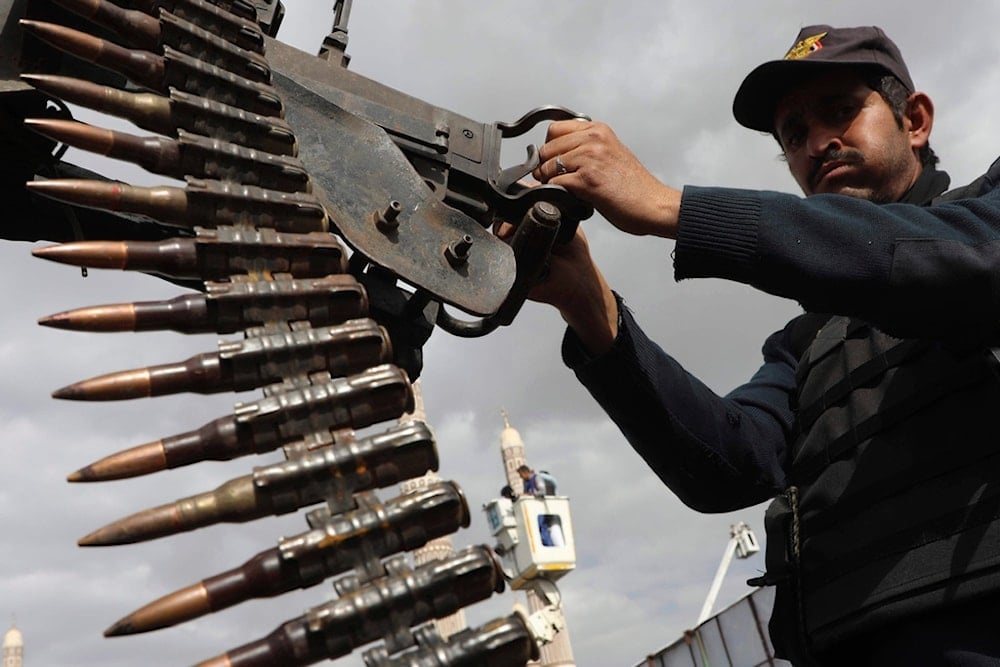Why 'Israel' cannot break the Yemeni Resistance: Analysis
Eldar Mamedov argues that "Israel's" strikes on Yemen have failed to weaken the Ansar Allah, instead reinforcing the Yemeni Resistance's role in the region while deepening Tel Aviv's isolation.
-

A Yemeni soldier stands alert on the sidelines of a weekly protest against the US and "Israel" in Sanaa, Yemen, Friday, July 11, 2025. (AP Photo/Osamah Abdulrahman)
Writing for Responsible Statecraft on Tuesday, foreign policy expert Eldar Mamedov says the campaign waged by "Israel" against the Ansar Allah reveals not strength but growing miscalculations that threaten to deepen its isolation in the region.
Israeli Security Minister Israel Katz's threat to "cut the hands" of his enemies reflects Tel Aviv's frustration, as Ansar Allah has emerged more resilient after months of bombardment by both "Israel" and the US.
Despite the latest strike on the Hizyaz power plant in Sanaa, the capital, the Yemeni Resistance has not only endured but strengthened its capabilities and expanded its role in the regional struggle.
Ansarallah’s expanding operations
Since October 2023, Ansar Allah has carried out near-daily attacks on "Israel"-linked shipping in the Red Sea as well as strikes on ports and airports inside occupied Palestine. By March 2025, the group had launched "more than 70 missiles and 22 drones" at "Israel," forcing the Red Sea port of Eilat to scale down operations by 90%, driving it toward bankruptcy and pushing global shipping insurance costs to record highs. Ansar Allah’s missile campaigns have also reached Ben Gurion Airport, forcing millions of settlers to flee.
"Israel's" retaliation, namely the expansion of strikes from military targets to vital civilian infrastructure, has had little strategic effect, according to Responsible Statecraft. Territories under Ansar Allah's control have long relied on decentralized energy solutions such as solar panels and generators, making attacks on power plants largely symbolic. Instead, these bombings strengthen the Yemeni resistance's claim of defending its people and confronting occupation, while further undermining "Israel's" standing.
Leadership within the axis
Ansar Allah's leader, Sayyed Abdul Malik al-Houthi, has increasingly positioned himself within the regional Axis of Resistance, continuing the legacy of Hezbollah's martyred leader Sayyed Hassan Nasrallah. In speeches, he has denounced Arab regimes for their "shameful weakness" before US and Israeli dictates, mocked Egypt's gas deals with "Israel" as a "sad paradox," and condemned regional leaders for betraying sovereignty while claiming to champion their people.
Read more: Arab inaction enables Israeli crimes in Gaza: Sayyed al-Houthi
For the US, the futility of escalation has already been acknowledged. After wasting more than $1 billion on failed bombing campaigns, Washington accepted an Oman-brokered ceasefire in May 2025 to protect its own assets, while leaving "Israel" to face Ansar Allah's continued strikes alone. Yet Tel Aviv persists with its aggression, striking civilian facilities in the hope of breaking the Yemeni resistance.
Mamedov warns that this mirrors the mistakes made against Hezbollah and Hamas: bombardment does not destroy resistance movements; it strengthens them. "History offers clear lessons," he writes. "From Hezbollah to Hamas to Houthis, asymmetric opponents don't surrender under bombardment; they evolve."
As long as "Israel's" genocidal war on Gaza continues, Ansar Allah has vowed to maintain its operations in solidarity with the Palestinians. According to Mamedov, Tel Aviv's chosen path "promises only deeper isolation, drained resources, and prolonged conflict."

 3 Min Read
3 Min Read










